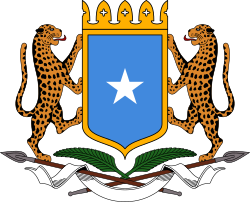20 June 1961 | |||||||||||||||||||
| Results | |||||||||||||||||||
|---|---|---|---|---|---|---|---|---|---|---|---|---|---|---|---|---|---|---|---|
| |||||||||||||||||||
 |
|---|
|
A constitutional referendum was held in Somalia on 20 June 1961 to vote on the new constitution for the country created the previous year by the union of the State of Somaliland and the Trust Territory of Somaliland. It was approved by 91% of voters. [1]
Contents
In the territory of former State of Somaliland, the Somali National League (SNL) party encouraged a boycott of the referendum, and 60% of the approximately 100,000 votes from the area opposed the constitution. However the south of the country had 1,952,660 voters, effectively giving the south the power of veto, and obfuscated the fact there was no popular mandate for a union. [2] However, the majority Dir and Darod northern cities of Borama and Las Anod voted yes in the referendum, with approval rates of 96 percent and 82 percent, respectively. [3]